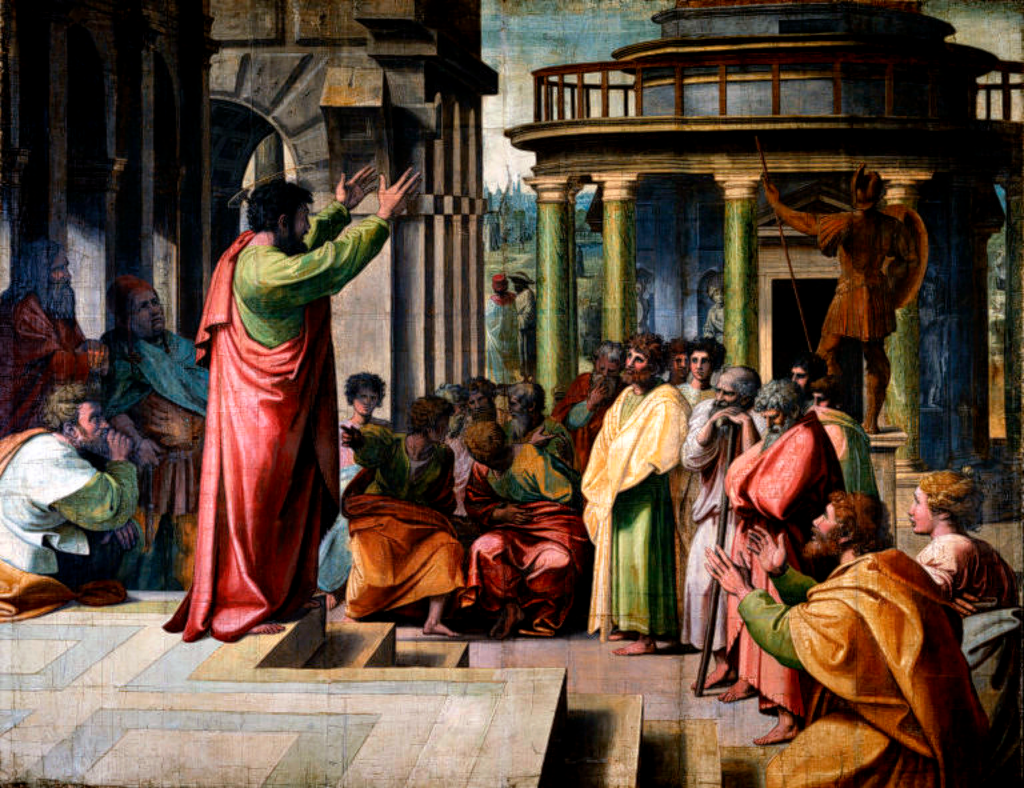Co-missioners,
We send along a sermon Steve Albertin shared with us recently. He preached it this past May 14th at Pilgrim Lutheran Church in Carmel, Indiana, on the north side of Indianapolis. Steve will soon be wrapping up a year of service there as Interim Pastor. He has also served for many years on the Crossings Board of Directors and contributes regularly to our Text Study and Thursday Theology offerings.
Of particular interest here is Steve’s use of Luther’s definition of “a god” in addressing people today. See below.
Peace and Joy,
The Crossings Community
___________________________________________________
On the Fear and Love of God
A Sermon on Acts 17:22-31
Sixth Sunday of Easter, 2023
by Steven Albertin
If you ever try to sell a home, one of the first things the real estate agent will tell you is to remove as many personal items as possible. Hide those family pictures, the family heirlooms, the knick-knacks, and all the other clutter you love that makes this house your home. It may be painful, but, as the agent will remind you, you are selling the house, not yourself.
If someone walked through our un-edited house, what they see will tell them a lot about us. They will get a snapshot of our loves: the books on the shelves, the art on the walls, the photos on the mantle, the bits of paper stuck to the fridge door, the unopened mail on the counter. Our stuff reveals what we value. It shows what our hearts are clinging to.
A stroll through our homes will also expose our fears, especially if someone does a little probing. The security system and the locks on doors and windows reveal our fear of home invasion and robbery. The gate at an entrance to a bedroom reveals our fear of an unsupervised encounter between a large dog and tiny toddler. The fire extinguisher? —a cooking experiment that might get out of control. The bills and bank statements on the desk? —financial uncertainty, mounting debt. Poverty.
The medicine cabinet is the most revealing of all, exposing a host of fears and their hold on our lives. Vitamins? —joint pain. Medicated shampoo? —dandruff, hair loss. Beta-blockers, diuretics? —stroke or heart attack. Sunscreen? —skin cancer, wrinkles. Some of these items reflect good management of our lives. Others reflect our childish preoccupations. All of them reflect our fears.
I think it could safely be said of all of us: our fears and loves reveal what is most deeply embedded in our hearts. Our fears and loves shape our lives more than anything else. What we love the most is also what we most fear losing.
Paul recognizes this as he preaches to the crowd on the Areopagus in Athens in today’s First Reading. The Areopagus, also known as Mars Hill, was a small rocky knoll on which philosophers would gather to debate the issues of the day. There court cases would be conducted. People would also come there to worship the gods. The Areopagus was filled with places of worship, altars and statues inscribed with the name of the god they commemorate. Paul can’t help but notice how “extremely religious” the Athenians were.
The first century Greco-Roman world was not that all different from ours. In the name of diversity, all gods were welcomed. There was a god for every need in life. If you wanted a better crop, a bigger family, a new girlfriend, improved weather or a military victory, there was a god for you. Say a few prayers, offer some incense or a sacrifice, and you might get what you loved and prevent what you feared.
Religion saturated the ancient world. Today’s American world is no different even though “gods” are no longer openly welcomed to the public square. Our world, with its “separation of church and state,” has relegated explicit practices of religion to the private sphere of personal tastes, preferences and superstitions. Even so, religion will not go away.
Today the fastest growing segment of American religion is those who identify themselves as “spiritual but not religious.” They are turned off by traditional practices of religion and will have nothing to do with “the organized church,” but they still sense a need to believe in something. They still need to love something. There still needs to be reason to get out of bed in the morning. There still needs to be something that matters, something that endures, something that is sacred—even if it’s nothing more than their family, a good glass of wine, or a mug of their favorite craft beer.
However, hidden behind every love is fear. We fear that we will lose what we love. We fear that we may not be able to keep what we value. We fear that there is someone or something lurking around the corner ready to snatch away what we love.
Our world may think that we live in an enlightened, secular, and scientific age free from the ignorance and suspicion of religion, but our world is as saturated with “gods” as the world of the Athenians who gathered to burn incense and say their prayers at the Areopagus. For as much as Martin Luther may have been a creature of the Middle Ages, his understanding of religion and God made him incredibly modern. Luther did not waste his time defending the supernatural and the existence of God. He assumed the truth of both and then moved on to what really mattered to him: how do we experience God in this world and life?
Luther’s explanation of the First Commandment in the Large Catechism makes this clear. There he reminds us that everyone has a god. Everyone has a religion, a way of making sense of life and having a reason to live. That is their god. They probably worship multiple gods just like the Athenians. Whatever they fear, love and trust above everything else is their god. Those idols made out of gold, silver and stone represented the fears and loves of the Athenians. No Athenian believed that a stone image was actually a god. However, they did believe that those stone images reflected powers and forces that permeated this world. These powers and forces needed to be appeased if people were going to enjoy good lives. They were afraid of what would happen if and when they failed to meet their demands.
Such is the essence of every idolatry. We take something good in God’s creation, like food, money, fame, youth, sports, success or beauty and turn it into a something it can never be: God. Only God can give us love that endures. Only God can give us life that lasts. Only God is worth our fear, love, and trust. Only God matters when everything else in this world crumbles, disappears and disappoints.
That is why the Athenians created an altar with the inscription “To An Unknown God.” They were afraid. They were afraid that they didn’t have all their bases covered, that there might still be some god out there they had not yet appeased.
In such a fear-ridden world, today’s second reading from 1 Peter reminded its first hearers, “Do not fear what they fear and do not be intimidated.”
Do not be afraid of the gods of silver, gold and stone. Do not fear unknown gods or the tyrants who try to play God by dangling before you cheap imitations of life. Do not be afraid of death. Do not try to preserve your bodies as if merely breathing is all that matters. Do not be afraid to be generous as if you have to hold on to every last coin.
And when your enemies wonder why you are still smiling and what unknown God you know that they don’t, you can point to Jesus.

St Paul Preaching at Athens – Raphael (1483–1520)
https://commons.wikimedia.org/wiki
Paul made the same point to the Athenians at the Areopagus. This God whom the Athenians feared and tried to placate at their altar to an unknown god—this is the God who created everything. This God is above and beyond all the other gods of the Areopagus. This is the God for whom they had always been searching. This is the God who is holding them accountable. This is the God whom they really need to fear, not their puny gods of silver, gold and stone but the God who created the heavens and the earth. This is the God who ought to make them shudder every time they realize that life is not under their control.
Then Paul surprises them. This is the God who made himself known not in the convulsions of nature or in the wonders of creation—but in Jesus Christ.
We meet Jesus and his God in today’s Gospel. Like the Athenians, the disciples are afraid. It is the night of Jesus’ betrayal. They know that storm clouds are gathering. Jesus has spoken of his coming departure. The disciples fear being left alone, cast adrift and orphaned. Who are they to trust? What will they do without the one they love? Jesus responds as he did to all of those who were afraid. He will not leave them orphaned. Yes, he will leave them for a while but he will return. They will see him again.
Jesus would walk straight into the darkness and be swallowed up by the world we all fear. He would place himself in the hands of the God whom we ought to fear more than anything else. Such was his commitment to his disciples—and to us. He would not leave them or us orphaned, alone and afraid. Jesus would go to the cross, confident that the God whom we ought to fear more than anything else is also the God we can love more than anything else. When Jesus was raised from the dead, God showed that Jesus was right.
Suddenly the things we thought we needed to fear seem trivial and insignificant. We no longer need to fear what others think of us. We no longer fear wrinkled skin and the mortality it warns is coming. We no longer have to fear that we don’t have all our bases covered and have to create an altar to an unknown god.
We also know that we don’t have to worry about what others may find when they come poking around in our closets and our lives. They may discover that we fret about our families and our health and about losing our stuff. However, it all pales in significance when compared to the one whom we fear, love and trust more than anything else. Nothing is worth fearing more than God, because there is no one is more worth loving more than God.
Because of Christ, we are free to care for a world that needs to know that it no longer needs to live in fear of some unknown god, because that unknown God has made himself known in the love of Christ.
Thursday Theology: that the benefits of Christ be put to use
A publication of the Crossings Community





You must be logged in to post a comment.